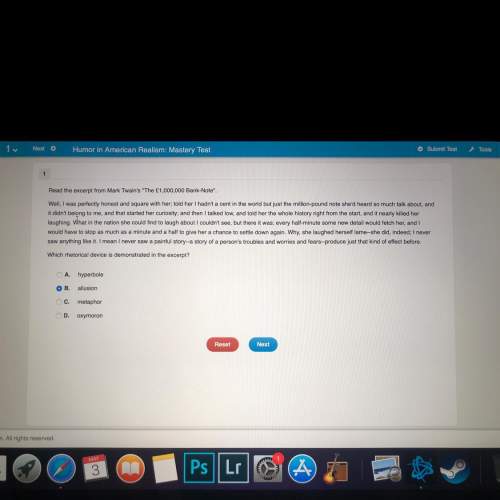
English, 12.10.2019 20:30 blaze9889t
Which rhetorical device is demonstrated in the excerpt? (pictured) i believe the answer is b but not 100% sure for plato


Answers: 3


Another question on English

English, 22.06.2019 04:50
Read the passage, then answer the question that follows. no one could have seen it at the time, but the invention of beet sugar was not just a challenge to cane. it was a hint—just a glimpse, like a twist that comes about two thirds of the way through a movie—that the end of the age of sugar was in sight. for beet sugar showed that in order to create that perfect sweetness you did not need slaves, you did not need plantations, in fact you did not even need cane. beet sugar was a foreshadowing of what we have today: the age of science, in which sweetness is a product of chemistry, not whips. in 1854 only 11 percent of world sugar production came from beets. by 1899 the percentage had risen to about 65 percent. and beet sugar was just the first challenge to cane. by 1879 chemists discovered saccharine—a laboratory-created substance that is several hundred times sweeter than natural sugar. today the sweeteners used in the foods you eat may come from corn (high-fructose corn syrup), from fruit (fructose), or directly from the lab (for example, aspartame, invented in 1965, or sucralose—splenda—created in 1976). brazil is the land that imported more africans than any other to work on sugar plantations, and in brazil the soil is still perfect for sugar. cane grows in brazil today, but not always for sugar. instead, cane is often used to create ethanol, much as corn farmers in america now convert their harvest into fuel. –sugar changed the world, marc aronson and marina budhos how does this passage support the claim that sugar was tied to the struggle for freedom? it shows that the invention of beet sugar created competition for cane sugar. it shows that technology had a role in changing how we sweeten our foods. it shows that the beet sugar trade provided jobs for formerly enslaved workers. it shows that sweeteners did not need to be the product of sugar plantations and slavery.
Answers: 1

English, 22.06.2019 06:30
Read the excerpt from "a defence of poetry.” poetry thus makes immortal all that is best and most beautiful in the world; it arrests the vanishing apparitions which haunt the interlunations of life, and veiling them, or in language or in form, sends them forth among mankind, bearing sweet news of kindred joy to those with whom their sisters abide—abide, because there is no portal of expression from the caverns of the spirit which they inhabit into the universe of things. poetry redeems from decay the visitations of the divinity in man. which details from the excerpt provide more information about shelley’s idea that poetry "makes immortal all that is best and most beautiful in the world”? check all that apply. arrests the vanishing apparitions which haunt the interlunations of life sends them forth among mankind, bearing sweet news to those with whom their sisters abide no portal of expression from the caverns of the spirit redeems from decay the visitations of the divinity in man
Answers: 2

English, 22.06.2019 08:20
Is conciseness and formality more of a courtesy than a requirement in an adjustment letter
Answers: 1

English, 22.06.2019 13:10
2pointsread this excerpt from the beginning of nikolai gogol's "the nose": on the 25th march, 18-, a very strange occurrence tookplace in st petersburg.which option best explains why gogol chose to begin his story in this way? oa. to let readers know that the story that follows is nonfictionb. to explain that information in the story is factual and correctooc. to immediately establish a straightforward and matter-of-facttoneod. to allow readers to better imagine what st. petersburg looks likesubmit
Answers: 2
You know the right answer?
Which rhetorical device is demonstrated in the excerpt? (pictured) i believe the answer is b but no...
Questions

Biology, 06.05.2020 07:09

Mathematics, 06.05.2020 07:09

Mathematics, 06.05.2020 07:09




Social Studies, 06.05.2020 07:09


Mathematics, 06.05.2020 07:10

Mathematics, 06.05.2020 07:10

Mathematics, 06.05.2020 07:10


Mathematics, 06.05.2020 07:10

Mathematics, 06.05.2020 07:10








